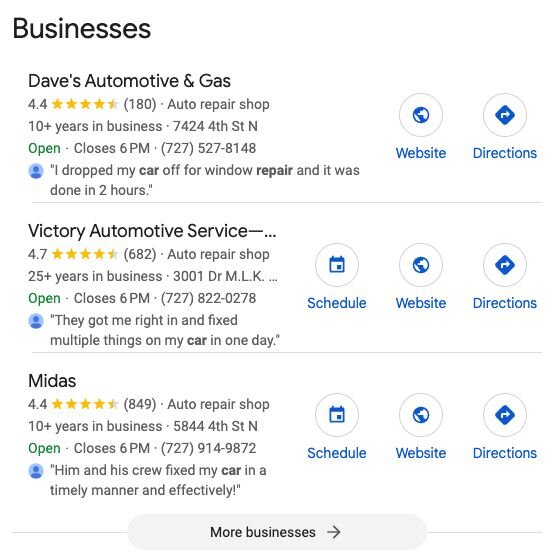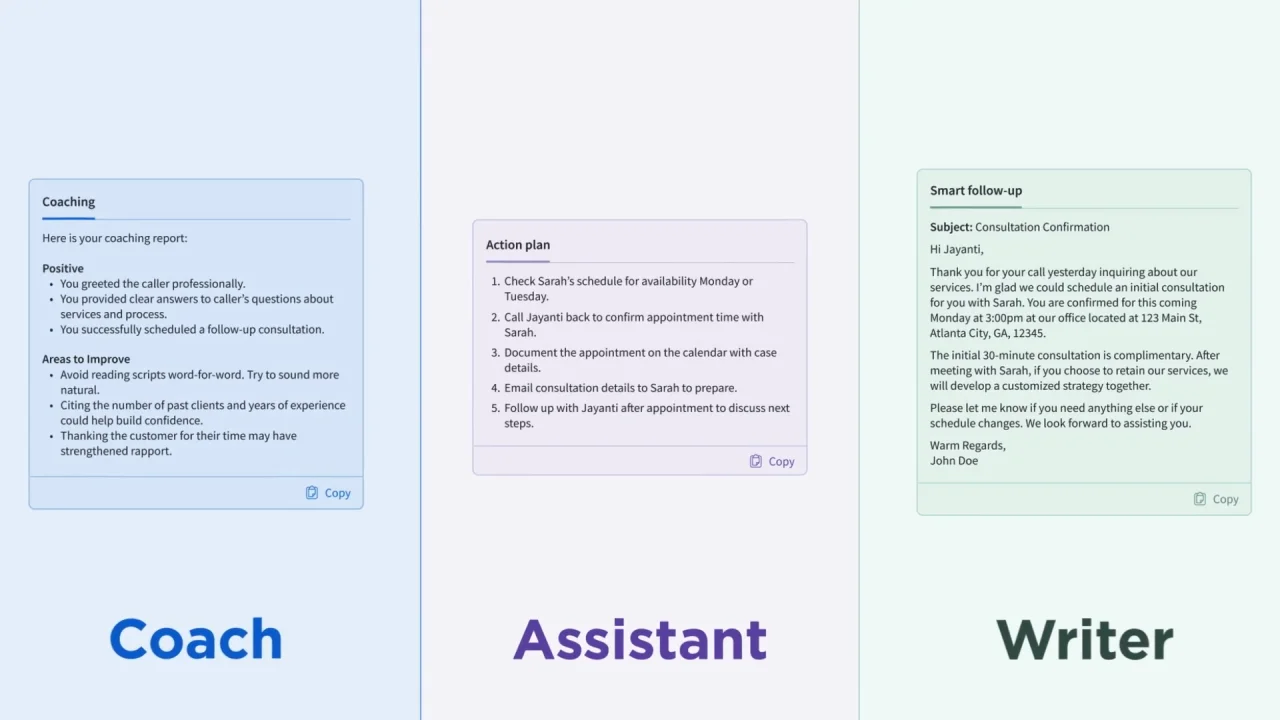The stage is set for automotive after-sale businesses — including collision repairs, maintenance, and towing — to be very busy over the next few years. With the threat of inflation and tariffs raising the prices of new cars, the decline of DIY auto repairs due to increasingly specialized technology and diagnostic tools, and the average vehicle being in use for more than 13 years, customers will be clamoring to find the best service providers.
To stand out from the competition and build your client base, service providers need to deliver excellent customer experiences at every point of the journey, from the first time they see your ad and call your shop to the moment you hand them back the keys. Today, we’re going to explore how Call Tracking, conversation analytics, and artificial intelligence (AI) can help you build a growing, loyal clientele.
How technology helps auto shops tune-up customer experiences
The fundamentals of the client-to-service provider relationship have remained the same over the years: when someone needs their car repaired and maintained, they bring it to your shop for service.
What has changed is the technology in cars, consumer preferences, and how you can use data to understand and improve the customer experience (CX). According to Zendesk, small businesses that deliver the best customer experience are reportedly 3.1 times more likely than other businesses to grow their customer base in the last six months and 18.3 times more likely to generally exceed customer satisfaction goals.
When a customer brings their car to your shop, you do everything you can to listen and understand them. That’s the goal here as well, but instead of face-to-face interactions, you want to understand how customers experience your brand online and over the phone.
To improve the customer experience, you need to be able to listen to and understand your customers’ experiences and take their feedback to heart. This can be challenging for many small businesses, but technology can help you understand how customers describe your business, and their needs and challenges in their own words. By understanding your customers better in this way, you can see how they think, speak, feel, and behave when addressing their problem and while interacting with your business, and use this information to create more effective marketing materials.
Shops and towing companies can use these strategies and tech to better understand their customers’:
- Wants and needs
- Specific questions
- Pain points in their search or your diagnostic process
- Overall experience with your shop
Customer conversations are a great place to capture these data points, but without a ton of manual labor, you probably rely on anecdotes and gut instinct to make these improvements or marketing decisions. But, thanks to AI, you’re now able to capture every word of a conversation and easily analyze them for insights and trends — work that would take days can now happen in minutes.
Below, we'll discuss the key components you need to set your shop up for AI-powered CX success.
The fundamentals: Call Tracking and conversation analytics
Think about how many calls and texts your business exchanges with leads and customers that you never see. AI can help you capture those conversations and will help you understand your customers and marketing more. But first, you need the fundamentals to set yourself up for AI.
Without a tool like CallRail’s Call Tracking, you likely have no idea how the person on the phone wound up calling you. Call Tracking helps you attribute calls and text messages to the marketing campaigns that drive them.
For auto shops, click-to-call Google Ads are a powerful way to connect with people who need help right away — like someone stuck on the side of the road or looking for same-day repairs. When combined with Google Local Services Ads, these tools can bring in a steady stream of local customers. But without Call Tracking, it’s hard to know which ads are actually bringing in those calls — meaning you might be overspending on the wrong campaigns without realizing it.

Call Tracking can help you understand how the parts fit together, but you need a tool that can analyze conversations to truly understand what’s driving your customers. Premium Conversation Intelligence™ can transcribe and analyze every call, which means you can:
- Analyze the sentiment of your calls
- Identify recurring pain points and concerns voiced by your customers
- Improve marketing messaging based on trending topics and keywords
- Catch unhappy customers early and step in to fix the situation
- Save hours a week trying to listen to calls and make improvements
Thanks to AI’s ability to analyze conversations quickly, call transcripts can now deliver even more value, from helping you understand what brought in a lead to improving follow-ups after an appointment.
How AI helps auto service providers pull ahead of the pack
What sort of insights can automotive after-sale businesses look for from AI to help improve customer experiences and marketing? Let’s take a look at one small example: new customer leads who get referred by word-of-mouth.
In a recent report into insights from 1.1 million leads, we found that returning customers and personal referrals accounted for just under half of the leads in the automotive industry. This is something you would know because a new customer will tell you a friend referred them, but it’s a critical data point you’d never usually track.
And a traditional analytics approach would likely miss that data point, too. For example, your tracking might show that a customer found you through an online search, but on the call, they mention, “My neighbor told me about your shop.” That’s the real source, and it matters. AI can listen and help capture these self-reported attributions during the conversation and automatically logs what the customer says brought them in — giving you a more accurate picture of what’s really driving your business.
That is only one such example of how AI builds upon the foundation of Call Tracking and conversation analytics. With so much potential in AI, it can feel overwhelming for businesses to know where to start. The end goal of using AI is to make your everyday life easier, not spending time making it work for your business.
That’s why CallRail built Convert Assist with small businesses in mind. It allows you to bring the power of AI into your business without the complexity. It’s designed with AI-powered actions tailored to cut down on the tedious, time-consuming tasks that come with every conversation and keep you from delivering the best customer service.
Convert Assist helps auto service providers in three ways:
1. Keep track of your next steps
When a customer calls to discuss a repair plan, your agent will discuss several options and next steps. Convert Assist analyzes every conversation to create a tailored list of to-dos for your team, from sending an email confirmation to preparing and sending the estimate. As a result, fewer tasks fall through the cracks, leaving clients more satisfied with their experience.
2. Understand what you can do better in each conversation
You can’t listen to every call, but Convert Assist can. With call coaching, you have access to an in-depth analysis of every conversation, including positive takeaways and areas for improvement. If, for example, Convert Assist detects an agent putting too much pressure on a customer, it might flag that dynamic and unlock a training opportunity that can improve service overall.
3. Get started with your follow-up message
In a hectic shop where the phone is constantly ringing, follow-ups can take a back seat to more urgent matters. Smart follow-up uses GenAI to analyze a conversation and draft a personalized follow-up message, allowing your team to quickly email a follow-up for every customer in record time.
These capabilities are just the start of what AI can do for your business. A new wave of AI assistants, like CallRail’s new Voice Assist, can work independently and engage callers in natural, real-time conversations for routine tasks.
This is a big deal for auto shops, since so many potential customers call when the business is closed. Voice Assist can be on the job when you’re off the clock, talking with customers, getting their information, and answering routine questions. Plus, if it’s urgent, you’ll know at-a-glance and can respond on your own as well. That way, a customer who might otherwise call around to other shops will be more likely to stick with your business.
AI is helping small businesses transform their customer experiences in ways not possible before, but the potential can also distract you from the goal: providing the best experiences and creating stronger relationships with customers. When you start with AI-powered tools like CallRail, you can get the benefits of AI while remaining focused on your mission.
Set the standard for excellence
AI-powered tools fueled with conversation analytics will play a key role for auto service providers looking to improve their customers’ experiences—from better marketing, to better over-the-phone service, to a deeper understanding of what customers want from the business.
CallRail makes it easier than ever to unlock the benefits of AI at your shop.
See how with a free 14-day trial.
Disclaimer: This article is based on aggregated and de-identified data and is provided for informational purposes only. To ensure the privacy of our business customers and comply with applicable data protection regulations, the analysis and insights presented herein are derived solely from deidentified data, excluding any sensitive or protected information as defined by privacy laws and regulations such as GDPR, CCPA, and HIPAA. This report aims to provide a comprehensive overview of market trends without compromising individual privacy. Any reliance on the information presented in this report is at the user’s own risk, and we disclaim any liability for decisions made based on this report.






